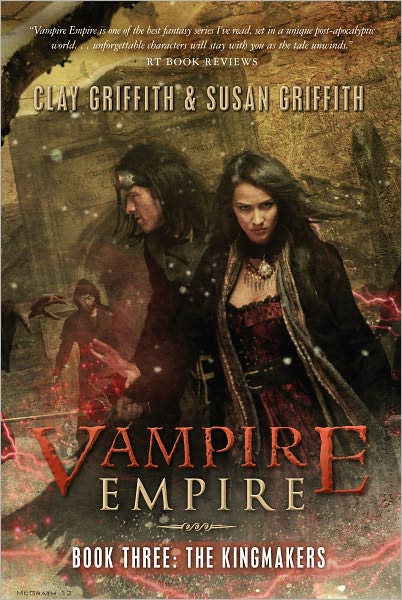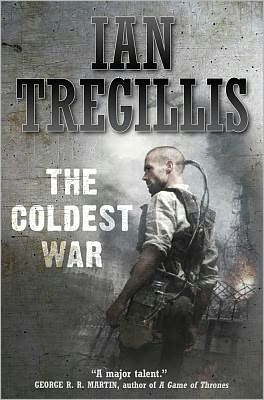After a fairly large batch of arrivals this week, a mix of publishers. I wasn’t expecting much to arrive this week with Comic-Con taking place the end of this past week.
 Whispers Underground
Whispers Underground by
Ben Aaronovitch (
Del Rey, Mass Market Paperback 07/31/2012) – Third in in Aaronovitch’s Paranormal Police procedural. With the third installment, Del Rey has begun to use the same cover design/style as the UK publisher. Mark review the first book
Rivers of London / Midnight Riot and liked it.
A WHOLE NEW REASON TO MIND THE GAP
It begins with a dead body at the far end of Baker Street tube station, all that remains of American exchange student James Gallagher—and the victim’s wealthy, politically powerful family is understandably eager to get to the bottom of the gruesome murder. The trouble is, the bottom—if it exists at all—is deeper and more unnatural than anyone suspects . . . except, that is, for London constable and sorcerer’s apprentice Peter Grant. With Inspector Nightingale, the last registered wizard in England, tied up in the hunt for the rogue magician known as “the Faceless Man,” it’s up to Peter to plumb the haunted depths of the oldest, largest, and—as of now—deadliest subway system in the world.
At least he won’t be alone. No, the FBI has sent over a crack agent to help. She’s young, ambitious, beautiful . . . and a born-again Christian apt to view any magic as the work of the devil. Oh yeah—that’s going to go well.
 The Wanderers
The Wanderers by
Paula Brandon (
Spectra Trade Paperback 07/31/2012) –Sequel / Third in the series to / of the series which began with
The Traitor’s Daughter, which has been getting quite a nice buzz. Brandon is something of an open pseudonym for Paula Volsky and this trilogy seems to have no name.
Paula Brandon’s acclaimed fantasy trilogy comes to a triumphant conclusion in an unforgettable collision of magic, intrigue, and romance.
Time is running out. Falaste Rione is imprisoned, sentenced to death. And even though the magical balance of the Source is slipping and the fabric of reality itself has begun to tear, Jianna Belandor can think only of freeing the man she loves. But to do so, she must join a revolution she once despised—and risk reunion with a husband she has ample reason to fear.
Meanwhile, undead creatures terrorize the land, slaves of the Overmind—a relentless consciousness determined to bring everything that lives under its sway. All that stands in the way is a motley group of arcanists whose combined powers will barely suffice to restore balance to the Source. But when Jianna’s father, the Magnifico Aureste Belandor, murders one of them, the group begins to fracture under the pressures of suspicion and mutual hatred. Now humanity’s hope rests with an unexpected soul: a misanthropic hermit whose next move may turn the tide and save the world.
 Queen’s Hunt
Queen’s Hunt (
River of Souls#2) by
Beth Bernobich (
Tor, Hardcover 07/17/2013) – Second installment in Bernobich’s fantasy saga. The first was well-received from what I’ve seen.
Queen's Hunt is the second title in Beth Bernobich’s River of Souls novels, following her startling debut, Passion Play. Filled with dark magic and sensual images, this is fantasy writing at its best.
Ilse Zhalina has left to start a new life in a garrisoned fort, leagues from her estranged lover, Raul Kosenmark. The violent quarrel that ended Ilse and Raul's relationship was quite public. And also, quite fake. They hope to mislead Kosenmark's enemies so that he can continue to influence the politics of the kingdom in an attempt to stave off an ill-advised war, while keeping Ilse safe from royal assassins who would kill anyone Raul is close to. Ilse longs for Raul, but is set on her own quest to find one of the three fabled jewels of Lir. One of the jewels is held by King Dzavek, sworn enemy of Veraene, who has used the jewel's power to live for centuries. Ilse seeks one of the other stones to counterbalance Dzavek's efforts to destroy her country.
In her search, she encounters a shipwrecked prisoner from another land, a woman who has a secret of her own...and the second jewel in her keeping. The two women become allies in their quest for the third jewel, because finding and controlling these stones could mean salvation for both of their nations. And their failure the ruin of their peoples..
 The Passage
The Passage by
Justin Cronin (
Ballantine Mass Market Paperback 07/11/2012) – This is the fourth copy I’ve received of this book (ARC, Hardcover, Trade Paperback and now Mass Market Paperback). You know what though, the book was
superb as I noted when I initially read it in 2010 so that gives me the opportunity to share the book again.
"It happened fast. Thirty-two minutes for one world to die, another to be born."
First, the unthinkable: a security breach at a secret U.S. government facility unleashes the monstrous product of a chilling military experiment. Then, the unspeakable: a night of chaos and carnage gives way to sunrise on a nation, and ultimately a world, forever altered. All that remains for the stunned survivors is the long fight ahead and a future ruled by fear—of darkness, of death, of a fate far worse.
As civilization swiftly crumbles into a primal landscape of predators and prey, two people flee in search of sanctuary. FBI agent Brad Wolgast is a good man haunted by what he's done in the line of duty. Six-year-old orphan Amy Harper Bellafonte is a refugee from the doomed scientific project that has triggered apocalypse. He is determined to protect her from the horror set loose by her captors. But for Amy, escaping the bloody fallout is only the beginning of a much longer odyssey—spanning miles and decades—towards the time and place where she must finish what should never have begun.
With The Passage, award-winning author Justin Cronin has written both a relentlessly suspenseful adventure and an epic chronicle of human endurance in the face of unprecedented catastrophe and unimaginable danger. Its inventive storytelling, masterful prose, and depth of human insight mark it as a crucial and transcendent work of modern fiction.
 An Officer’s Duty
An Officer’s Duty: (Book Two of
Theirs Not to Reason Why) by
Jean Johnson (
Ace Mass Market Paperback 07/31/2012) – The first novel in this sequence was nominated for a Philip K. Dick Award and very nearly a year later, Johnson and her publishers manage to publish the second book. Impressive, though not surprising since Johnson is a popular and accomplished romance novelist.
Jean Johnson—the national bestselling author of the Sons of Destiny novels—returns to the world she introduced in A Soldier’s Duty with a terrible vision of the future...
Promoted in the field for courage and leadership under fire, Ia is now poised to become an officer in the Space Force Navy—once she undertakes her Academy training. But on a trip back home to Sanctuary, she finds the heavyworld colony being torn apart by religious conflict. Now Ia must prepare her family and followers to secure the galaxy’s survival. Her plan is to command a Blockade Patrol ship. Her goal, to save as many lives as she can. But at the Academy, she discovers an unexpected challenge: the one man who could disrupt those plans. The man whose future she cannot foresee...
 Chasing Magic
Chasing Magic (
Chess Putnam #4) by
Stacia Kane (
Del Rey Mass Market Paperback 06/26/2012) – Kane’s managed to churn out one book a year in this series, which is pretty impressive..
A DEADLY HIGH
Magic-wielding Churchwitch and secret addict Chess Putnam knows better than anyone just how high a price people are willing to pay for a chemical rush. But when someone with money to burn and a penchant for black magic starts tampering with Downside’s drug supply, Chess realizes that the unlucky customers are paying with their souls—and taking the innocent with them, as the magic-infused speed compels them to kill in the most gruesome ways possible.
As if the streets weren’t scary enough, the looming war between the two men in her life explodes, taking even more casualties and putting Chess squarely in the middle. Downside could become a literal ghost town if Chess doesn’t find a way to stop both the war and the dark wave of death-magic, and the only way to do that is to use both her addiction and her power to enter the spell and chase the magic all the way back to its malevolent source. Too bad that doing so will probably kill Chess—if the war doesn’t first destroy the man who’s become her reason for living.
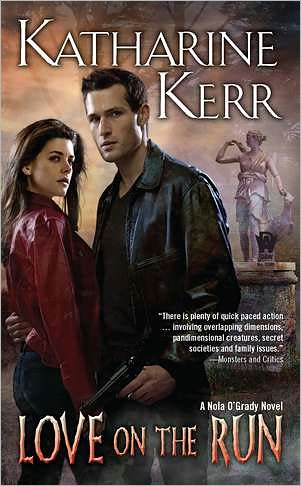 Love on the Run
Love on the Run (
Nola O’Grady Book 4) by
Katherine Kerr (
DAW Mass Market Paperback 08/07/2012) – Fourth installment in Kerr’s series. Impressively, she and her publisher have been releasing two installments per year.
A Fishy Situation
Nola O’Grady is sick and tired of psychic squid-images following her everywhere, waving their tentacles and generally making nuisances of themselves. She and her partner, Ari Nathan, have a dangerous job on their hands, hunting down two criminals who have escaped into another level of the multiverse, the San Francisco of Terra Six.
Terrorists have turned parts of that city into a deathtrap—religious fanatics, yes, but from what religion? Nola suspects that the Peacock Angel Chaos cult lies behind the bombings and mass murders. As she gathers evidence, she finds herself face-to-face with part of her own personal past that she’d prefer to bury forever.
And by the way, just who is it that keeps trying to kill her?.
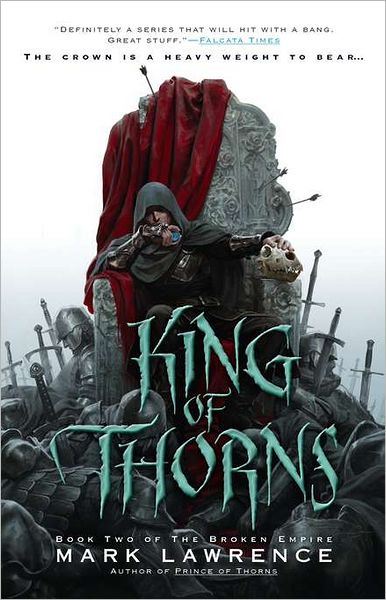 King of Thorns
King of Thorns (Book Two of
The Broken Empire) by
Mark Lawrence (Hardcover 08/07/2012
Ace) – I was extremely impressed with the first in this series,
Prince of Thorns which I also thought was the
best debut published in 2011, and I just
posted my review about a week ago as of this posting.
In Book One of the Broken Empire, Mark Lawrence brought to life the “morbidly gripping”* (Publishers Weekly) story of a boy in search of power and vengeance. Now, in King of Thorns, that boy’s journey into manhood takes him to the dark depths waiting within his soul…
The boy who would be King has gained the throne...
Prince Honorious Jorg Ancrath vowed when he was nine to avenge his slaughtered mother and brother—and punish his father for not doing so. When he was fifteen, he began to fulfill that vow. Now he is eighteen—and he must hold on by strength of arms to what he took by torture and treachery.
King Jorg is a man haunted: by the ghost of a young boy, by a mysterious copper box, by his desire for the woman who rides with his enemy. Plagued by nightmares of the atrocities he committed, and of the atrocities committed against him when he was a child, he is filled with rage. And even as his need for revenge continues to consume him, twenty thousand men march toward the gates of his castle. His enemy is far stronger than him. Jorg knows that he cannot win a fair fight.
But he has found, in a chamber hidden beneath the castle, ancient and long-lost artifacts. Some might call them magic. Jorg is not certain—all he knows is that the secrets they hold can be put to terrible use in the coming battle...
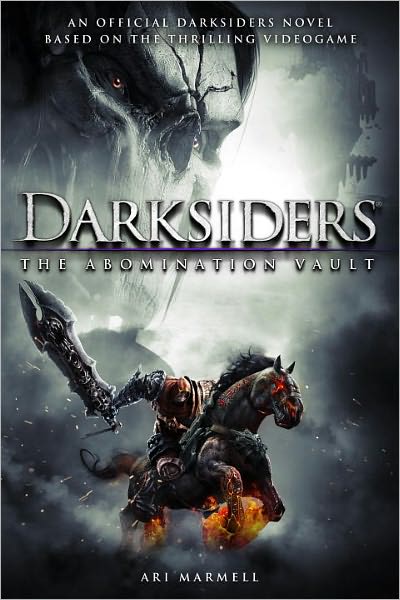 Darksiders: The Abomination Vault
Darksiders: The Abomination Vault by
Ari Marmell (
Del Rey Trade Paperback 07/24/2012) – Marmell is a smart, funny writer and I have no doubt he’ll do justice to this popular video game series.
Ride with the Horsemen of the Apocalypse as they seek to unearth a plot that could plunge all of Creation into chaos!
Ages before the events of Darksiders and Darksiders II, two of the feared Horsemen—Death and War—are tasked with stopping a group of renegades from locating the Abomination Vault: a hoard containing weapons of ultimate power and malice, capable of bringing an end to the uneasy truce between Heaven and Hell . . . but only by unleashing total destruction.
Created in close collaboration with the Darksiders II teams at Vigil and THQ, Darksiders: The Abomination Vault gives an exciting look at the history and world of the Horsemen, shining a new light on the unbreakable bond between War and Death.
 Fever Moon
Fever Moon (
Fever Series) by
Karen Marie Moning (
Dellacorte Press Hardcover 07/10/2012) – Moning is another in the long line of urban fantasy authors whose stories are being told in graphic novel format. This one is a brand new story, though.
An all-new Mac & Barrons story by #1 New York Times bestselling author Karen Marie Moning, marvelously adapted into a full-color graphic novel by writer David Lawrence and illustrator Al Rio
In Fever Moon, we meet the most ancient and deadly Unseelie ever created, the Fear Dorcha. For eons, he’s traveled worlds with the Unseelie king, leaving behind him a path of mutilation and destruction. Now he’s hunting Dublin, and no one Mac loves is safe.
Dublin is a war zone. The walls between humans and Fae are down. A third of the world’s population is dead and chaos reigns. Imprisoned over half a million years ago, the Unseelie are free and each one Mac meets is worse than the last. Human weapons don’t stand a chance against them.
With a blood moon hanging low over the city, something dark and sinister begins to hunt the streets of Temple Bar, choosing its victims by targeting those closest to Mac. Armed only with the Spear of Destiny and Jericho Barrons, she must face her most terrifying enemy yet.
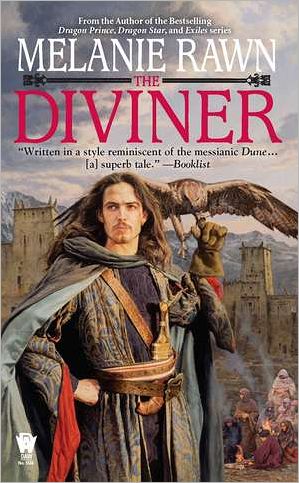 The Diviner
The Diviner by
Melanie Rawn, - (
DAW , Mass Market Paperback 08/07/2012) – Prequel to
The Golden Key which Rawn co-wrote with
Jennifer Roberson, and
Kate Elliott. This is a re-reprint of the World Fantasy nominee by three of the top Fantasy writers from DAW’s stable.
Bestselling author Melanie Rawn's triumphant return to high fantasy.
The only survivor of royal treachery that eliminates his entire family, Azzad al-Ma'aliq flees to the desert and dedicates himself to vengeance. With the help of the Shagara, a nomadic tribe of powerful magicians, he begins to take his revenge-but at a terrible cost to himself.
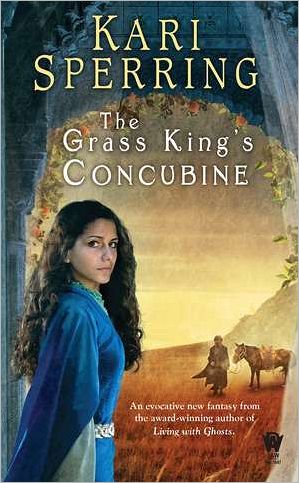 The Grass King's Concubine
The Grass King's Concubine; by
Kari Sperring (
DAW Mass Market Paperback 08/07/2012) – Sperring’s second novel is a follow-up to her debut novel.:
Kari Sperring's first novel was a finalist for the Crawford Award, a Tiptree Award Honor Book, a LOCUS Recommended First Novel, and the winner of the Sydney J. Bounds Award for Best Newcomer. Now she returns to the same amazing and atmospheric world with an entirely new story set several hundred years after the earth-shaking events of Living With Ghosts.
When a wealthy young woman, obsessed with a childhood vision of a magical Shining Palace, sets out with her true love to search for a legendary land, she discovers the devastated WorldBelow - the realm of the Grass King - and the terrifying Cadre, who take her prisoner, and demand she either restore the king's concubine... or replace her.

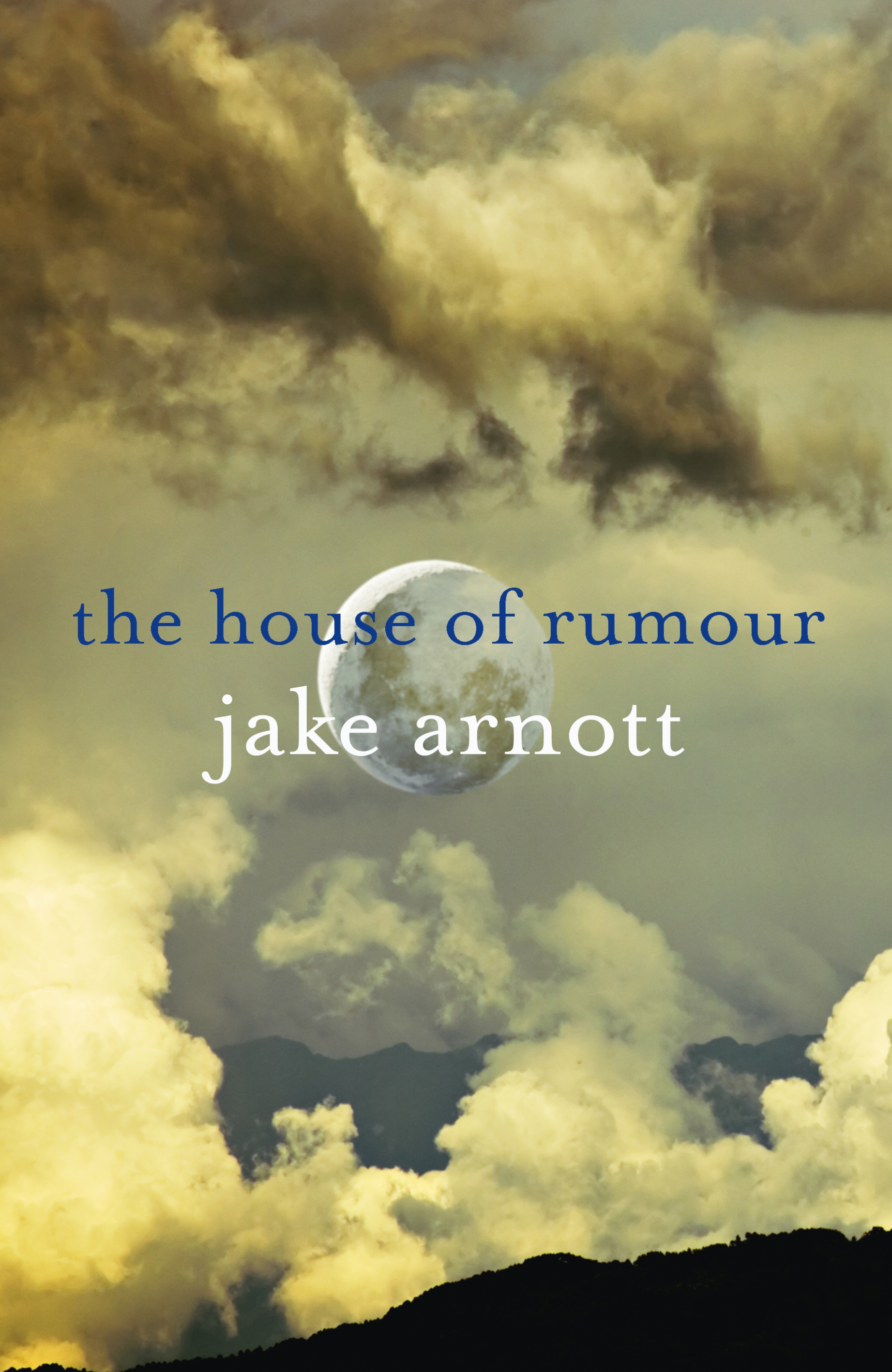



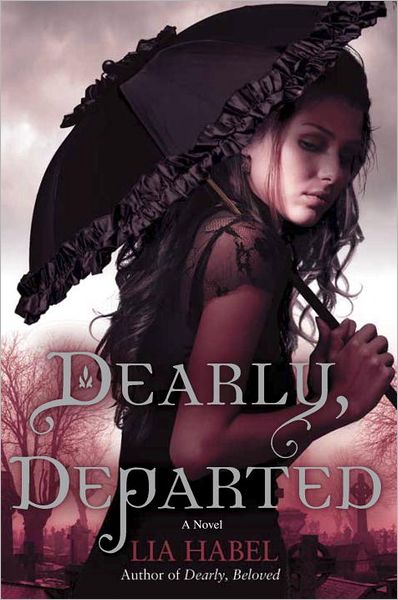


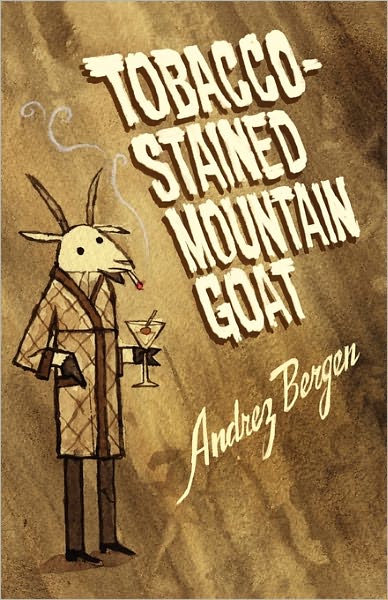

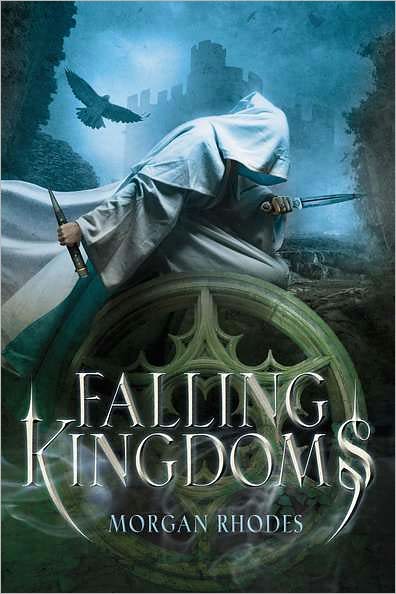


















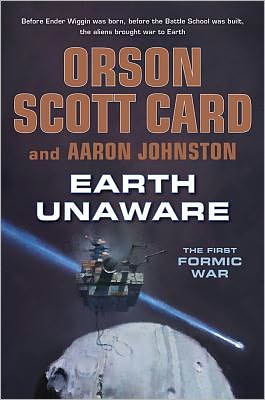

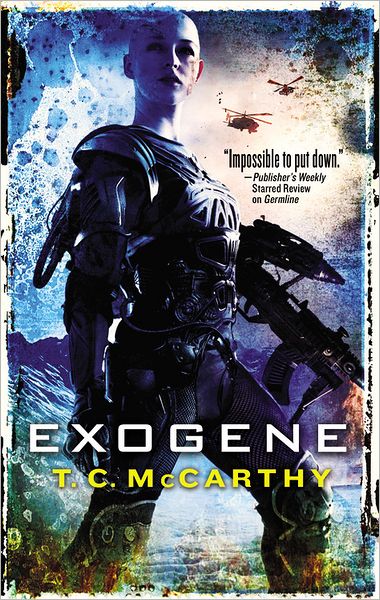
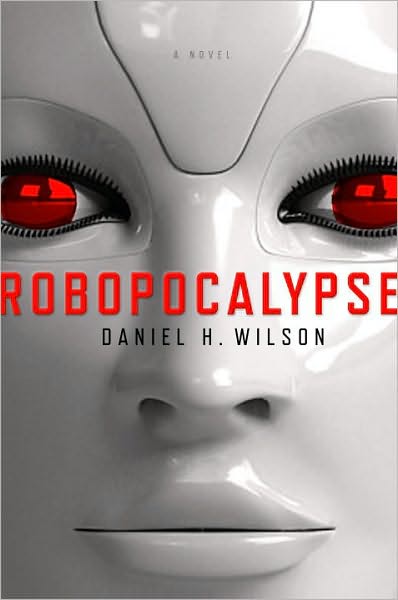
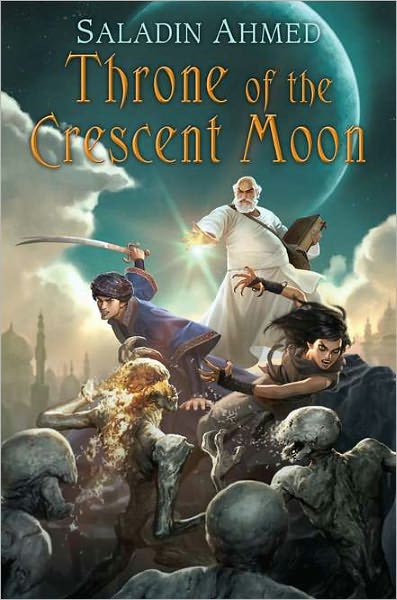




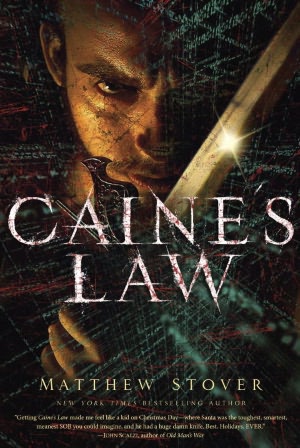
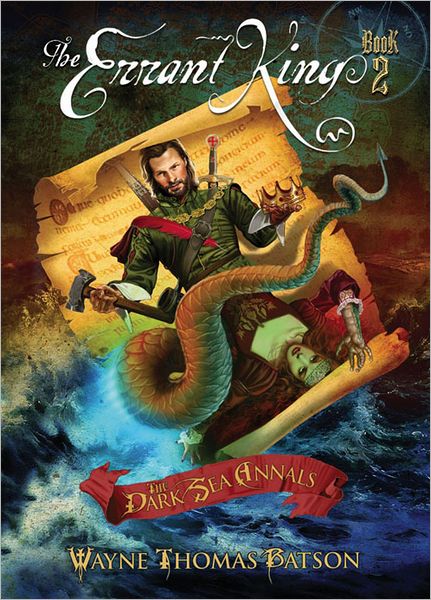
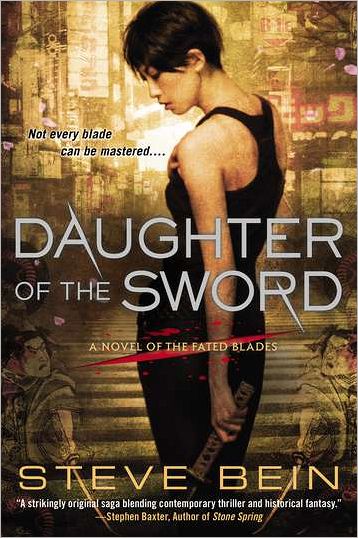 Daughter of the Sword (
Daughter of the Sword (
